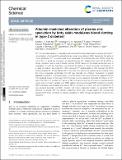Albumin-mediated alteration of plasma zinc speciation by fatty acids modulates blood clotting in type-2 diabetes
Abstract
Zn2+ is an essential regulator of coagulation and is released from activated platelets. In plasma, free Zn2+ concentration is fine-tuned through buffering by human serum albumin (HSA). Importantly, the ability of HSA to bind/buffer Zn2+ is compromised by co-transported non-esterified fatty acids (NEFAs). Given the role of Zn2+ in blood clot formation, we hypothesise that Zn2+ displacement from HSA by NEFAs in certain conditions (such as type 2 diabetes mellitus, T2DM) impacts on the cellular and protein arms of coagulation. To test this hypothesis, we assessed the extent to which increasing concentrations of a range of medium- and long-chain NEFAs reduced Zn2+-binding ability of HSA. Amongst the NEFAs tested, palmitate (16:0) and stearate (18:0) were the most effective at suppressing zinc-binding, whilst the mono-unsaturated palmitoleate (16:1c9) was markedly less effective. Assessment of platelet aggregation and fibrin clotting parameters in purified systems and in pooled plasma suggested that the HSA-mediated impact of the model NEFA myristate on zinc speciation intensified the effects of Zn2+ alone. The effects of elevated Zn2+ alone on fibrin clot density and fibre thickness in a purified protein system were mirrored in samples from T2DM patients, who have derranged NEFA metabolism. Crucially, T2DM individuals had increased total plasma NEFAs compared to controls, with the concentrations of key saturated (myristate, palmitate, stearate) and mono-unsaturated (oleate, cis-vaccenate) NEFAs positively correlating with clot density. Collectively, these data strongly support the concept that elevated NEFA levels contribute to altered coagulation in T2DM through dysregulation of plasma zinc speciation.
Citation
Sobczak , A I S , Katundu , K G H , Phoenix , F A , Khazaipoul , S , Yu , R , Lampiao , F , Stefanowicz , F , Blindauer , C A , Pitt , S J , Smith , T K , Ajjan , R A & Stewart , A J 2021 , ' Albumin-mediated alteration of plasma zinc speciation by fatty acids modulates blood clotting in type-2 diabetes ' , Chemical Science , vol. 12 , no. 11 , pp. 4079-4093 . https://doi.org/10.1039/D0SC06605B
Publication
Chemical Science
Status
Peer reviewed
ISSN
2041-6520Type
Journal article
Description
This work was supported by the British Heart Foundation (grant numbers PG/15/9/31270, FS/15/42/31556) and travel grants from the Commonwealth Scholarship Commission (grant number MWCN-2017-294) and the International Co-operation project of Qinghai Province (grant number 2021-HZ-806).Collections
Items in the St Andrews Research Repository are protected by copyright, with all rights reserved, unless otherwise indicated.

